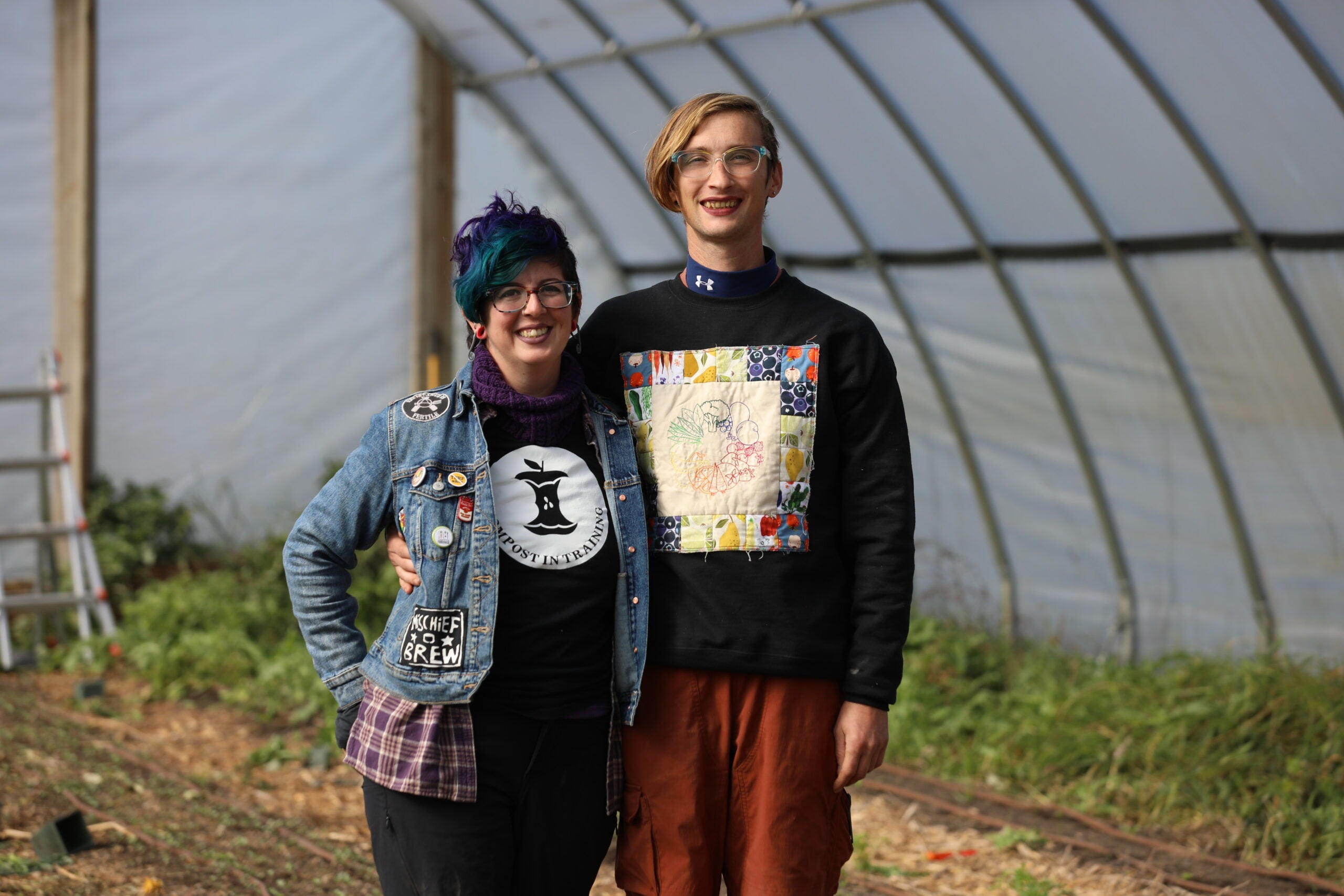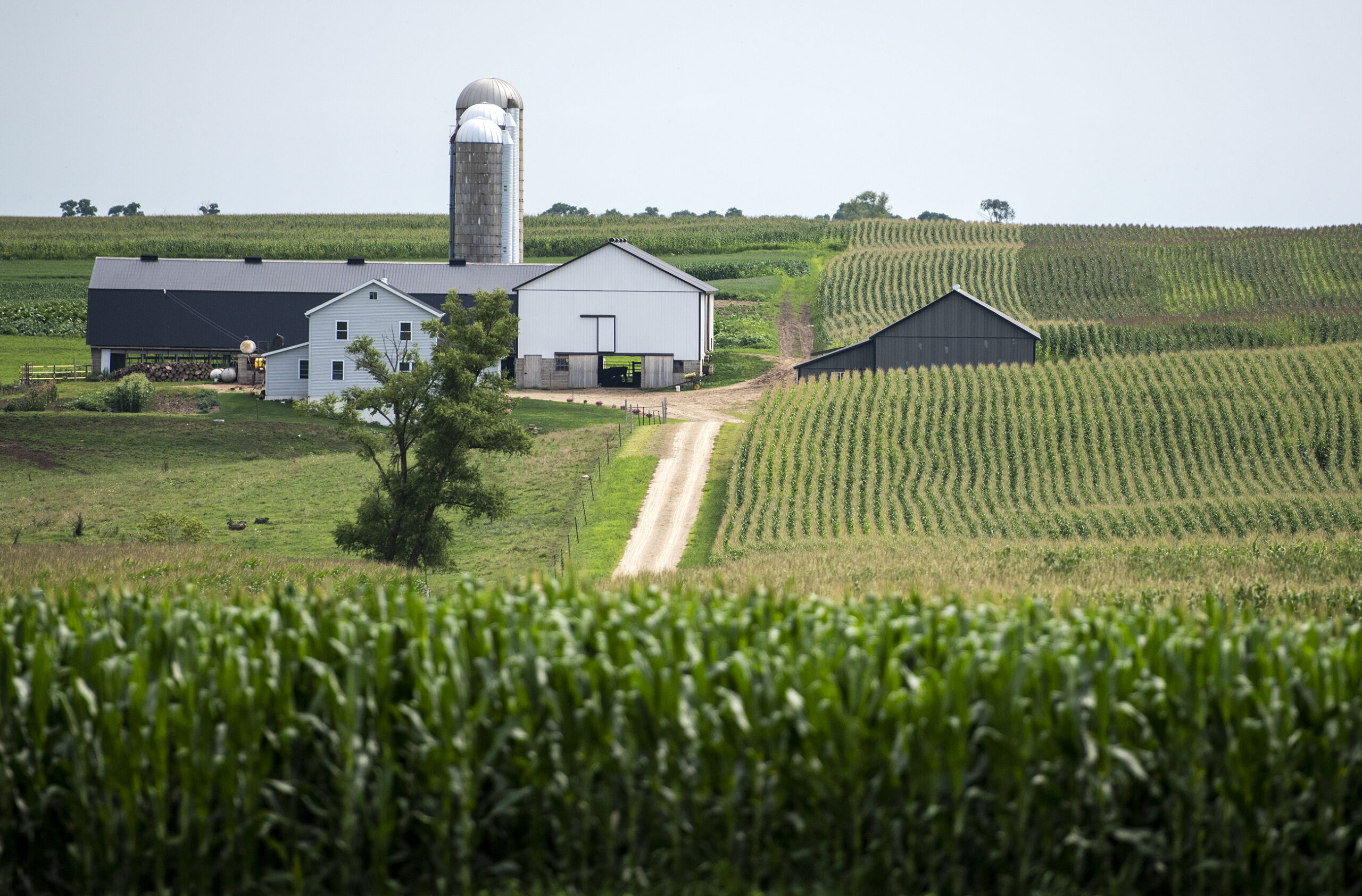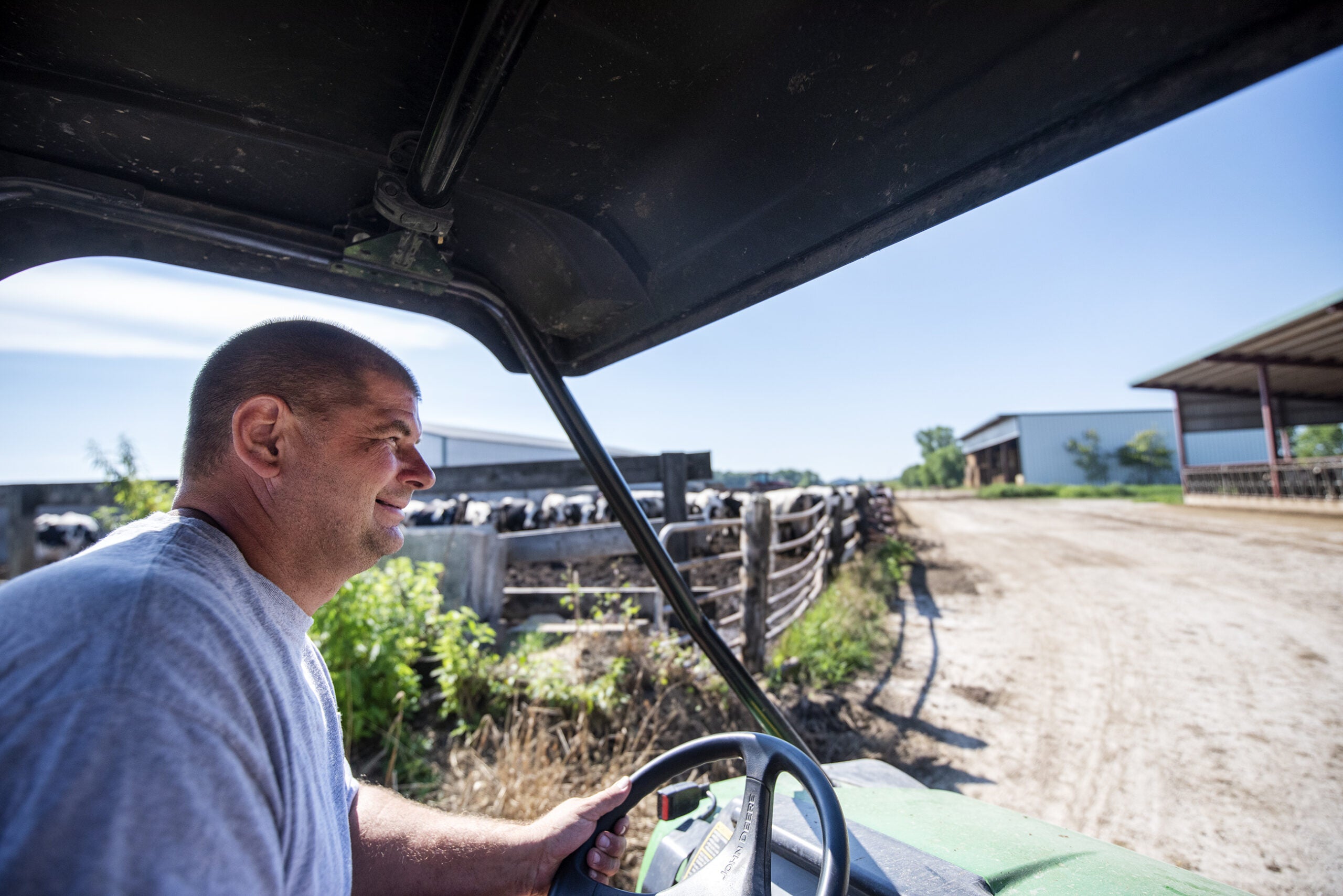Shannon and Eve Mingalone describe their farmers market booth as “very gay.”
They hang strings of pride flags and sell rainbow stickers to help pay for Eve’s gender-affirming care.
Sometimes, when parents and their teenagers pass the booth, the adults glance, then speed ahead. The kids pause. Shannon, 34, hopes they find meaning in seeing LGBTQ professionals out and succeeding.
News with a little more humanity
WPR’s “Wisconsin Today” newsletter keeps you connected to the state you love without feeling overwhelmed. No paywall. No agenda. No corporate filter.
People often share stories. The woman who confided that her daughter is transgender. The teen who stood in the booth and said, “This makes me feel safe.”
“That means everything to me,” Shannon said.
She and Eve, 35, grow more than 45 varieties of vegetables at Ramshackle Farm, in Harvard, Illinois.
Lettuces and Asian greens emerge on hydroponic troughs and spinach in a warm hoop house. Outside, Shannon and Eve tend to arugula, broccoli, peas and radishes — never using pesticides or synthetic fertilizer.
Their operation contrasts with the sprawling corn and bean fields that dominate the landscape. The Mingalones feed people, not livestock or cars.
They are among many LGBTQ farmers who draw connections between their identities and agriculture. Like many, they used to have a specific image of a “typical farmer”: white, male, heterosexual, Christian and conservative. Excluded from that vision — or perhaps myth — is a space for them.
So they are creating one.
The community is not a monolith, interviews with 16 Midwestern LGBTQ producers indicate. Some use restorative techniques. Others run conventional operations. As LGBTQ farmers navigate hurdles, ranging from land inaccessibility to federal lending restrictions to social isolation, they survive on creativity and resilience.
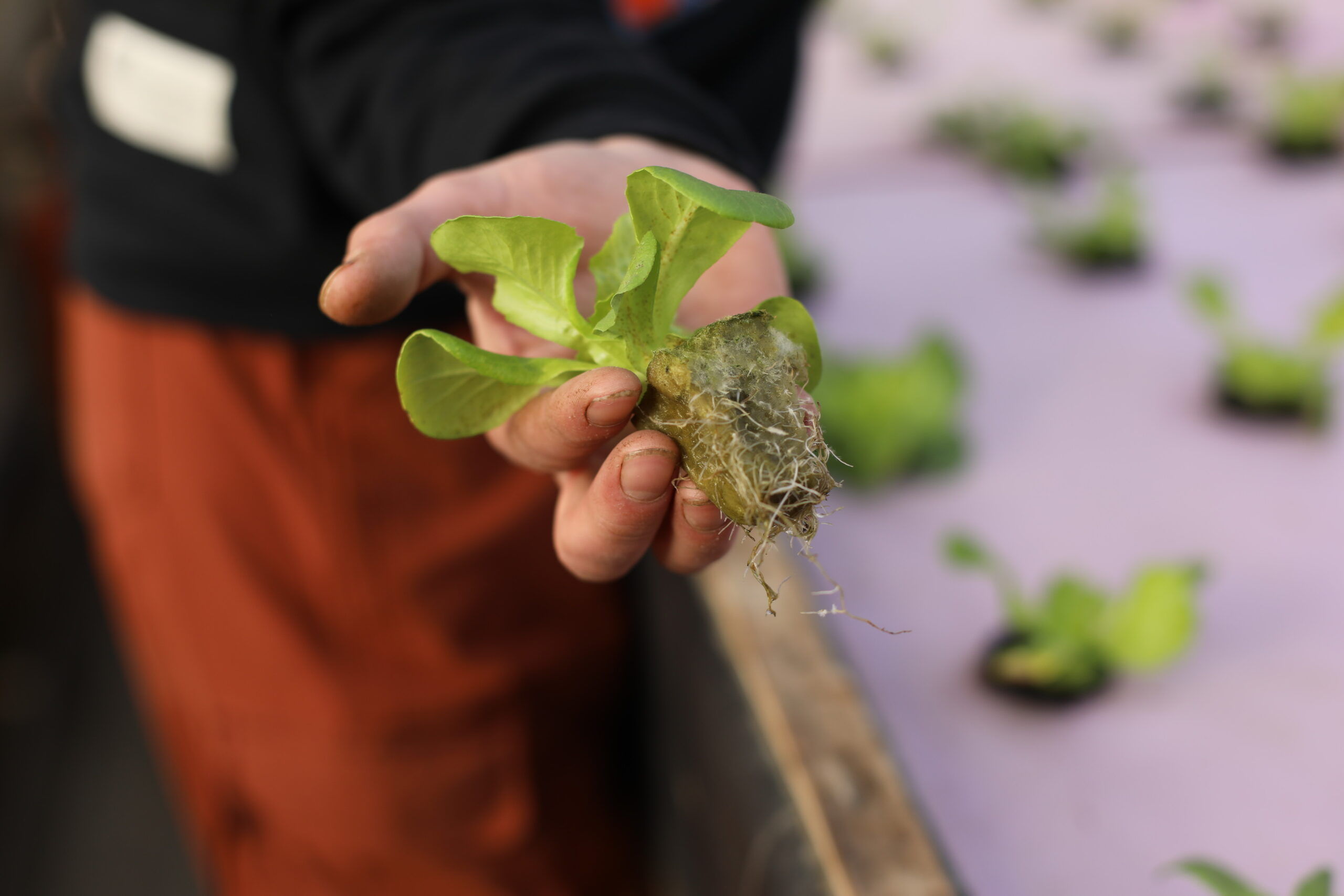
USDA doesn’t count LGBTQ farmers
No definitive figures tally LGBTQ people farmers in America. The U.S. Department of Agriculture hasn’t asked about sexual orientation or gender identity in its five-year censuses.
The department is considering adding those questions in 2027. It studied the possibility in 2021, but response rates decreased, and the pilot project drew political pushback. U.S. Sen. Josh Hawley, R-Mo, accused the USDA and President Joe Biden of advancing a “woke agenda.”
But a failure to acquire such demographic information prevents improvements to services, said Katie Dentzman, a sociology and public policy assistant professor at Iowa State University.
“If you’re completely unaware that these people are out there, then their issues are completely being ignored,” she said.
Dentzman jimmied a statistical workaround using the USDA’s 2017 census, finding that 8,302 farms were overseen by men married to men and 3,550 by women married to women. That was about 1.2 percent of all dually run farms nationwide.
Many same-sex couples farmed conventionally, Dentzman found. But same-sex married men were more likely to have organic land and grow products intended for human consumption than farms run by men married to women. Likewise, women married to women more often engaged in alternative practices like intensive grazing.
Might LGBTQ people’s unique vantage draw them to sustainable farming?
It’s possible, Dentzman said, but the disadvantages queer people face also might funnel them into there.
LGBTQ people experience higher rates of poverty and food insecurity compared to non-LGBTQ people. They also earn less dollar-for-dollar and disproportionately experience homelessness.
Then add the upfront costs of farming.
Land access remains a top obstacle to entering agriculture, and attempting to do so without family support can be a Herculean task as crop costs soar nationwide.
Corbin Scholz, 27, operates Rainbow Roots, an organic farm “rooted in queerness” on 6 acres of rented land north of Iowa City, Iowa. She doesn’t come from a farm family and works two other jobs to support herself.
Scholz’s lease expires after the 2024 growing season and she doesn’t know whether she will be able to renew.
“I’m not sure I’ll be able to ever afford a farm,” Scholz said.
Family link keeps Iowan farming
No rainbow flags hang on the red barn at Hoefler Dairy.
But it’s apparent the men who live there are hitched when one casually grabs the other’s butt while working in the milking parlor.
Under the drone of equipment, Andy Ferguson walked down a row of cows to check that the milkers were running smoothly. His husband, John Hoefler, a third-generation dairy farmer, crouched to retrieve a bucket of rags. Outside, dusty brown fields — freshly combined during the autumn harvest — stretched across the hills surrounding New Vienna, Iowa.
Hoefler feels fortunate to own a farm. He milks 230 cows, occasionally with help from Ferguson, who is a school administrator in nearby Dubuque.
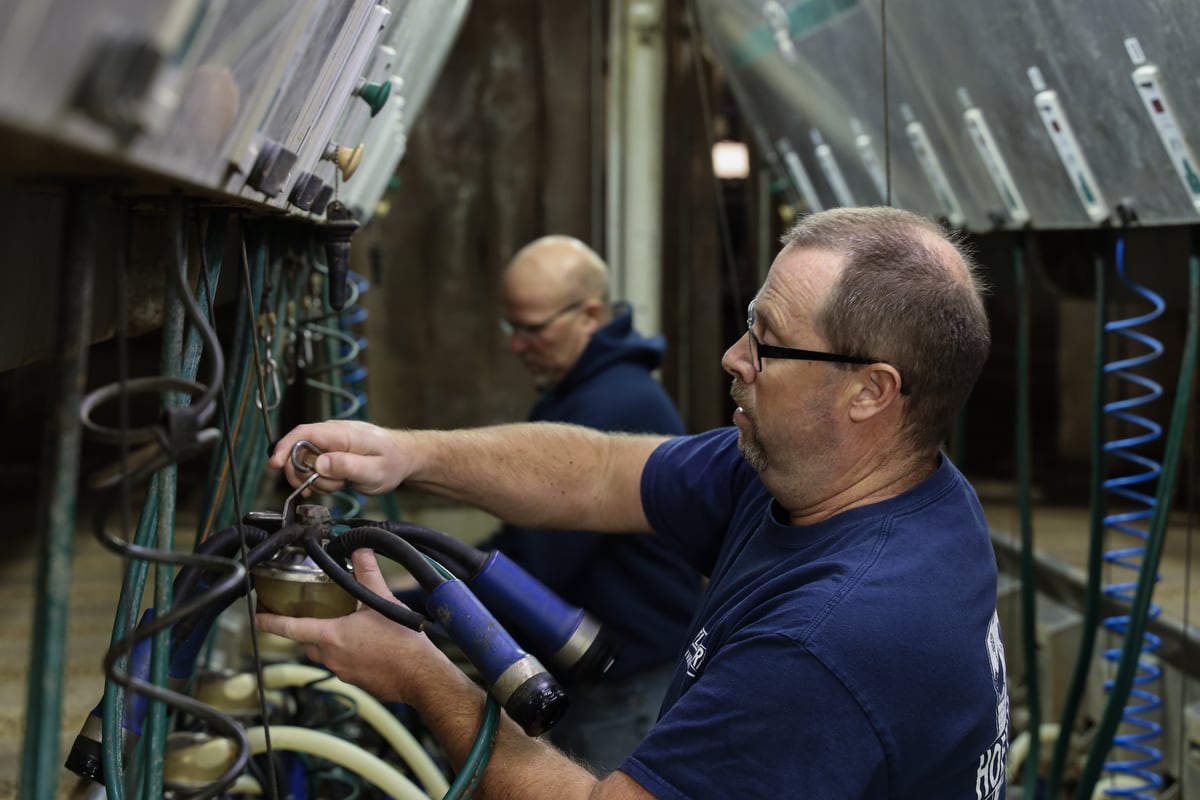
Both 51-year-olds previously were married to women and fathered children.
It was the normal thing to do, said Hoefler, who spent nine years with his wife.
“I thought I could just do it.”
But he couldn’t.
Hoefler’s divorce upset his father. That his son was gay added to his distress. He tried to take Hoefler to the hospital after the secret came out.
“Because you’re sick,” his father told Hoefler.
Hoefler feared his dad would kick him off the farm and sever ties permanently.
His mother successfully intervened.
Father and son didn’t speak for three years. But they continued to milk side by side in silence. Hoefler doubts he would be farming today had he lost his family link to the dairy.
Relationships, kinship matter
Intimate relationships and economic capital are bound together, said Isaac Leslie, an assistant professor at the University of Vermont Extension. Often, farmers turn to partners and family for labor, extra income and health insurance.
“In the process of accessing each of these key resources, queer farmers face barriers that cisgender and heterosexual farmers don’t,” said Leslie.
Locating a partner in rural America poses challenges when there are fewer queer people and gathering spaces. Rural areas trend religiously and politically conservative.
Moreover, two traditional avenues to land acquisition — marriage and inheritance — can prove tenuous. Wedding into ownership was not necessarily an option across the country until the U.S. Supreme Court broadened access to same-sex unions in 2015. Inheriting a farm might be off the table for LGBTQ people whose familial relationships have frayed.
The family makeup of a farm is crucial for those seeking government support.
Many USDA loans, such as those for beginning farmers and ranchers, require that the applicant operate a “family farm.” That means “the majority of the business is owned by an operator and any individuals related to them by blood, marriage or adoption.”
LGBTQ people who face biological or legal hurdles toward creating families might forge non-family business partnerships for assistance, disqualifying them for certain loans.
The USDA is working to ascertain the needs of LGBTQ farmers, the spokesperson said. The department held the first-ever LGBTQ farmer roundtable in June to learn how producers access department programs. The USDA is also planning listening sessions to “better understand issues and barriers” facing LGBTQ farmers.
In the absence of “traditional” families, LGBTQ people — farmers included — are constructing their own relationships.
“Queer people have different perspectives on life,” said Rufus Jupiter, 42, a flower farmer living in Viroqua, Wisconsin. “Just the verb ‘to queer’ is taking whatever is the status quo and seeing what different possibilities exist.”
Finding family in community
Chef Fresh Roberson, 40, grew up poor but valued the abundant food growing around them.
Roberson, who uses she and they pronouns interchangeably, was raised in Rocky Mount, North Carolina, where the railroad tracks separated Black from white residents. Roberson could locate any food needed, whether from an aunt’s pecan tree or a cousin’s grapevine.
Roberson moved to Chicago in 2001 to study biomedical engineering at Northwestern University. One day, they decided to bake a pecan pie but discovered they couldn’t afford a bag of pecans.
“I don’t think I really thought about it in that perspective until something that was always abundant for me, I couldn’t afford,” Roberson said.
They later changed course. Roberson went on to work on an organic, heirloom farm; attend culinary school; start a catering company; travel to California; work in the Silicon Valley kitchens of Google and Facebook; return to Chicago and manage a mobile produce market.
Now they run Fresher Together. Located in Chicago’s South Shore neighborhood, it exists to improve community access to fresh food. A team of staff, fellows and volunteers farms on 0.25 city-owned acres and oversees a nearby community hub and aggregation space, where they store, wash and pack food.
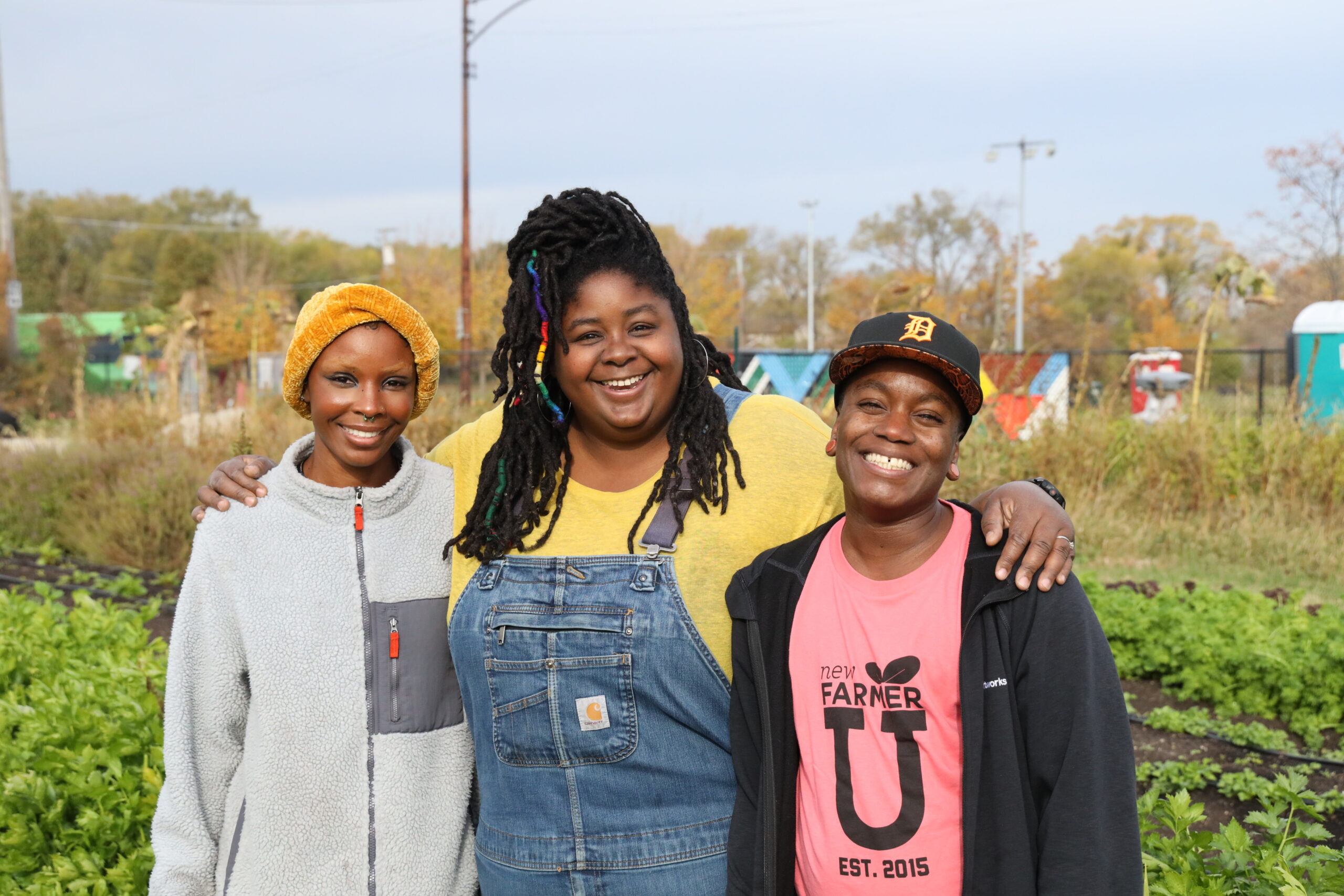
“A lot of how we are building is through this lens of choosing our family — choosing our loved ones who we are taking care of,” Roberson said.
Each week of the growing season, Fresher Together creates harvest bags filled with produce, herbs and value-added products from the urban farm and other businesses owned by people of color.
Other LGBTQ farmers have looked to unconventional financing models to launch operations.
Hannah Breckbill, a vegetable, pork and lamb farmer in Decorah, Iowa, said her local USDA Farm Service Agency classifies her 22-acre, organic operation as a “home garden,” which disqualifies her from utilizing some financial programs. She did not attempt to secure an FSA loan when she started farming because she lacked confidence the agency would take her efforts seriously. So, Breckbill, 35, purchased the land using donations and personal savings.
In 2018, she organized her business as a worker-owned cooperative and created “the Commons” — a capital account that was funded by donations and constitutes 40 percent of the farm’s ownership. Nobody owns the Commons; it is a shared resource.
Resisting stereotypes
Not all LGBTQ farmers link their identities to farming.
Liz Graznak, who grows organic vegetables outside of Columbia, Missouri, believed that she had to stay guarded when she moved to her rural community in 2008.
“I didn’t want people to know that I was a lesbian,” said Graznak, 46. Not only was that a futile effort in a small town, she said, it also mischaracterized residents’ attitudes.
While polls have measured less acceptance in rural communities for issues like same-sex marriage and LGBTQ nondiscrimination protections compared to urban residents, a majority of rural residents nonetheless agree with such policies.
“In the country, at least from my experience, people are much more concerned about the kind of person that you are,” Graznak said. “Are you kind? Are you helpful? Will you stop and help somebody change their flat tire on the side of the road?”
This story is a product of the Mississippi River Basin Ag & Water Desk, an editorially independent reporting network based at the University of Missouri School of Journalism in partnership with Report For America and funded by the Walton Family Foundation. Wisconsin Watch is a member of the network. Sign up for our newsletter and donate to support our fact-checked journalism.

